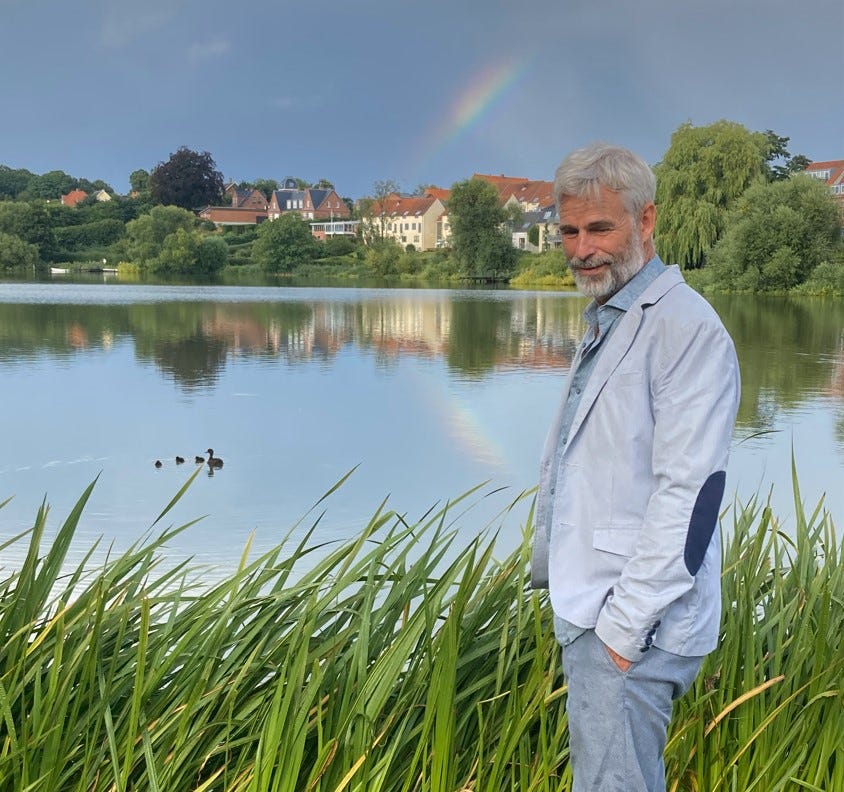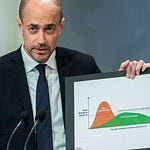The Danish Illusion
A book written by Flemming Blicher
FOREWORD
'Once upon a time'….these are three little words which make me think of two great and very prolific Danes, both of whom happen to be authors. One is known country-wide, yeah even world-wide, and has been loved by the Danish people, and of course by people abroad, for his amazing fairy tales. The other is hated by the Danish power elite and so far, he is only known to a very small group of Danes. This group does not see this author as a writer of fairy tales, but as an important historian who bravely and unselfishly has made himself as unpopular with the elite, as the little boy, who boldly proclaims that ‘the emperor has no clothes on.' I think there is a good chance that he, before too long, also will be known country-wide, and maybe even loved, as much as the old author of fairy tales. Furthermore, I fervently believe he is one of Denmark's few real patriots.
His name is Martin Tidsvilde and he is an author and historian, who often makes use of the fairy tales of Hans Christian Andersen to illustrate the emerging real history of Denmark which he has discovered. It would not be an exaggeration to call his writing controversial – indeed, there are not many Danish books as controversial as his!
What makes them controversial is his claims about how power and rule is exercised in Denmark and how this power has developed since 1849 when King Frederik the 7th granted Denmark its first constitution, the socalled “Grundlov”. Tidsvilde is of the opinion that the official power never left the monarchy and to prove his claim, he has the text in Denmark's current constitution, which became applicable on the 5th of June 1953. This is in black and white, written in the Constitution, that the king has the exercising power in Denmark and, at the same time the king shares the legislative power with the Danish parliament, the ‘Folketing’.
According to the law of succession within the Danish monarchy, passed on the same date as the Constitution came into place, the throne must be passed down to a son or daughter of the reigning king. This means that, when it is written ‘the King' in the Constitution it may as well mean 'the Queen'. Whilst it would seem that all Danes assume that Denmark's king is just a figure head with a rubber stamp, without any real influence on the exercise of power in Denmark, Tidsvilde claims the opposite; that the king does not only have the official power, he also exercises his power actively, and yet so subtly that the secret is well kept.
And these are controversial claims. It is understandable that many Danes do not at all feel like occupying their thoughts with Tidsvilde's statements, for this simple reason: It is easier to allow oneself to be lied to than it is to acknowledge that you have actually been lied to all your life. And when all Danes, like the subjects in The Emperor's New Clothes (the famous fairy tale by H.C. Andersen) are of the common conviction that the emperor truly has his fancy clothes on, then why waste precious energy on the opposite claim?
This, I think, is the main reason why so far only a small group of Danes have taken interest in Martin Tidsvilde's writing. It is my recommendation to everyone who really takes an interest in Denmark and the future of Denmark, to at least read “The paragraphs of power – the history of Denmarks Constitution”, which is his first book in his trilogy about the Constituation.
When I decided to write about the Danish illusion I also decided to split my writings into several books. This is the first of these books. The successive books are called The 3 Fictions and The Freethinkers. This should not leave the reader in any doubt about my own conviction, which is that Danes are not especially well-informed about the true circumstances of the Danish state, and certainly their place within it.
So, I share Martin Tidsvilde's opinion that Danes have been put into a very dense fog regarding the Denmark in which they live and this is what I wish to make clear with these books. The reality which most Danes perceive about Denmark is an illusion, which can easily be taken apart. When Danes finally embark upon their own journey of discovery, many of the well-regarded institutions of the Danish society simply fall to the ground. The first to fall are especially Danish democracy, the Danish legal system and the Danish financial welfare state. This is completely common with the Danish people's perception of these three ‘golden eggs' and the warm self-satisfied glow of Danish virtuosity of being 'the role model of the world'. I will make use of these three so challenged areas as the basis with which to describe the three fictions: The democratic fiction, the legal fiction and the financial fiction.
Whilst this book is meant to help the reader get to the point where they are prepared to view the world a little more in black and white, my following books will expand on this basic premise considerably. The reader will see the gradual unveiling of the world just as I have experienced it during the three years until I published this book in Danish in the spring of 2023. It was during these three years that I experienced the three fictions. I hope that I will succeed in telling the story in such a way that the reader will feel entertained and at the same time will obtain a good insight into my experiences. I want to warn you that this is not for the faint hearted and let me also add that the difference between ‘illusion’ and 'fiction' may seem trivial. So, in explanation, I mean that as the author, I have decided that the three 'fictions' is the best way to describe the overall illusion.
When one writes so bluntly, which I began to do in 2023, it is, at the same time, important for me not to patronise the reader and also the remaining Danish, and World population. I also do not wish to 'thumb down' the country which, up until now, has given me so much for all my life. I love the Danish people and I love Denmark. However, it is expressly because of this love that I feel moved to write this book so as to attempt to influence the future of this country for the better and to give our future generations even more incentive to get out of bed in the morning.
Up until the end of 2019 I was still convinced that Denmark had an amazing democracy and comprehensive and effective legal institutions and I was also proud of the Danish economic model and that Denmark was a shining light for the rest of the world to strive toward.
Here at the beginning of 2023, I do not believe it is too late for Denmark to transform into a real role model for the rest of the world. However, it is not really about Denmark, the country. Indeed, Denmark is just an area within borders drawn by our predecessors and to a great degree Denmark is a conveniently constructed enclave. Right now I am in Hellerup - a suburb of Copenhagen - and less than twenty-five kilometres due east, separated by a small patch of water, people call themselves Swedes and live under different rules than I do. How can it be that the dotted line cutting through the Øresund straight, causing a sharp separation of people, is perceived as the most natural thing in the world? It is really just a line that can be seen on a man-made map. This reminds me about the situation after the fall of the Berlin wall; even though it had physically disappeared, the wall still existed in the minds of the Berlin population. The fact that it still existed in Berliners' minds still influenced their actions every day. The Berlin wall remained as an illusion of the past, although it had physically been torn down!
Therefore this book is not about Denmark, the country. It is about you and me and everybody else in this country – and in the rest of the world. What do we want from life and what do we want to pass on to the next generations?
This book has been written with a critical gaze on the existing institution of power in Denmark. The critique is especially trying to reveal that Danish people are not being told the truth about this institution of power, but they are being misguidedly led to believe that there are no better ways of governing Denmark.
Even though I forcefully argue against the existing institution of power in Denmark, the reader should not regard this book as an attempt to provide better solutions. This is not the intention with this book, neither with the second book, nor the third. The intention is to bring the Danes together around what is really going on in their little duck pond. When Danish people have acquired a better understanding of what is really going on, I am sure that the population will want to take part in the parliamentary process of how to best govern this country to the benefit of all. Neither myself, nor any of the organisational initiatives in which I am involved are to have any special influence on defining the future of our country. This is something we need to do together - all of us, the people. Denmark, and an eventual Danish state, or whatever you will call the governing system, must be by the people, for the people. Today, unfortunately, it looks like the attitude of the governing institution is that the people exist only to serve the state.
When the Danish people are rid of indoctrination and can see the state of affairs for what they really are, then I will assume that the people will want to take part in forming the government of the future Denmark. It must be a process which will take some time and which cannot and must not be pushed.
I am very aware that the battle in Denmark is closely connected with the battle for justice in most of the other nations and populations around the world, if not the entire World.
The closest I get to suggesting solutions to the challenges of government in this book are when I touch upon subjects like decentralisation of power, direct democracy/people rule and, of course, the term 'natural law'.
I am of the opinion that we need to take the opposite direction as opposed to where Denmark is headed right now. Instead of centralisation of power, which is happening at speed today, we must undergo a radical decentralisation of power, so that the people can again feel that they are themselves the society in which they live. They need far more direct access to take part in decision-making about their society, and especially about their local community and their local area in which they live and work.
Likewise I have the opinion that the Danes, as well as all other modern populations around the world, must rediscover nature's own laws instead of having the attitude that the modern human being ranks far above what is natural. By 'natural law' I do not mean such laws which recent Danish Governments seek to pass new versions of, where rewilding and fencing off nature are focal points. This is an utterly crazy project controlled directly by the power machine and yet another symptom of the inexorable march of ruling politics.
Natural Law, seen in human and societal context, means that we respect all living things in the universe and that we experience ourselves as inseparable parts of our surroundings. One would therefore never feel the need to harm other living beings, either physically or mentally. Instead, one would always seek to heal the wounds which are constantly inflicted in our world, and always to live in the greatest possible harmony with our surroundings and the whole universe, whatever form that might have. Should it happen, that one did break the laws of nature and any man-made laws founded thereon, one should be tried by a people's jury. Here the term 'common law' is drawn in and you will also be able to read a little about that in this book and the succeeding book.
However, as previously mentioned, before we can even begin to discuss solutions, we need to be much more in agreement about what the true state of Denmark currently is. Therefore this book is about lifting the scales from the eyes as we Danes, and indeed all humans on Earth, gradually come to realise the illusion that we have been lulled to sleep with – the illusion about Denmark and other Western nations as role models for the rest of the world.
When the book was published in Danish I decided to supply it with the subtitle "The Three Lost Years". This can sound quite negative. What Denmark and the rest of the World have gone through during the three years from 2020 to 2023 is not without some gain, for "what is outwardly lost must be gained inwardly". It has, for example, become very clear during the past three years, that Denmark is not the country we thought it was, and that an illusion about Denmark exists, and this illusion is also in existence in all other countries. This book is about how I discovered this illusion. I hope that this book will help you to see the illusion clearly and I wish you a gratifying experience while you are reading it!















Share this post